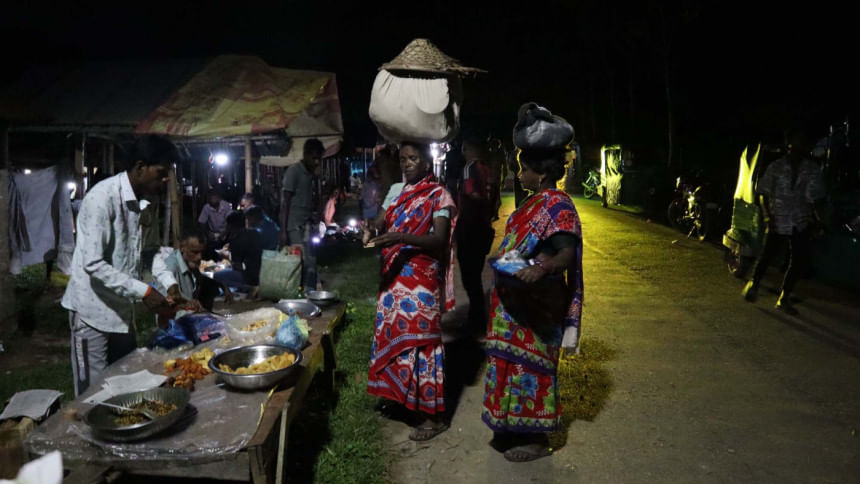Mirtinga’s weekly night market: Where generations meet beneath the flicker of kerosene lamps

Mirtinga Bazar in Kamalganj upazila of Moulvibazar has stood the test of time -- for over a century, locals say -- as a symbol of community, where laughter, conversation, and livelihood unfold in the soft glow of kerosene lamps.Every Thursday evening, locally called "Talbabar", the market comes alive. It's payday for tea garden workers, who receive weekly wages of around Tk 1,000 to Tk 1,500. With that modest sum, they clear small debts with vendors and buy essentials -- rice, lentils, salt, oil...
Mirtinga Bazar in Kamalganj upazila of Moulvibazar has stood the test of time -- for over a century, locals say -- as a symbol of community, where laughter, conversation, and livelihood unfold in the soft glow of kerosene lamps.
Every Thursday evening, locally called "Talbabar", the market comes alive. It's payday for tea garden workers, who receive weekly wages of around Tk 1,000 to Tk 1,500. With that modest sum, they clear small debts with vendors and buy essentials -- rice, lentils, salt, oil, and, if the week has been kind, a little fish.
"Mirtinga Bazar's offerings reflect the lives of the people it serves," said Dhona Bauri, 70, a local union parishad member. "Small farmed fish, local vegetables, garlic, onion, and dry goods line the lanes. Most items are priced with frugality in mind. But for many, bargaining is a necessity, not a choice."
Calling it a patchwork of "open-air stalls," Dhona added, "Vendors sit under tin roofs or on polythene sheets spread over the ground. There are no boundaries, no fixed schedules -- just long-standing trust between seller and buyer, and a shared understanding of hardship."
He recalled visiting the night market with his father and grandfather. "They always said this is a hundred-year-old market," he said.
Among the crowd is Sadhona Ghatual, a tea garden worker. "Many women come here with children. They move slowly through the narrow lanes, checking the goods, calculating in their heads. Even when tired, transactions end with a smile," she said.
"Every Thursday after work, we come here with a small bag. With what we get paid, we buy what we must -- no more, no less," she added.
For vendors, too, Mirtinga Bazar is built on relationships spanning generations.
Gobinda Charan Bhattacharjee, a sweets and dry food trader from Bhairab Bazar in Sreemangal, has been coming here for 30 years. "This market has become an inseparable part of my life. There's a relationship here that goes beyond selling and buying," he said, arranging his trays of khoi, jilapi, and goja.
Nearby sat Abbas Mia from Munshibazar, carefully stacking betel leaves. "My father sold betel leaves here before me. I've been doing this for decades," he said.
Mobashir Ali, a vegetable trader, has been sourcing fresh produce from Mirtinga Bazar for the past two decades to sell in Moulvibazar town. "Sometimes I buy local chicken too -- whatever I can get at a fair price," he said. "Buyers in Moulvibazar often ask if the goods are from Mirtinga Bazar. If they are, people know they're fresh. My father was in the same line of work, and I've followed in his footsteps."
For many vendors, business is not booming, but steady -- rooted in familiarity and trust. Most sellers come from nearby villages rather than the tea gardens themselves, yet their connection to the market runs deep.
Makhon Chandra Sutradhar, upazila nirbahi officer of Kamalganj, described Mirtinga Bazar as "more than just a centre for trade." He said, "It stands as a cultural landmark for the local community. Despite challenges like price fluctuations, changing crop yields, and the rise of home gardening, this market continues to uphold a long-standing tradition and a strong sense of togetherness that has endured for generations."
The night wears on, but Mirtinga Bazar keeps its own time. No electricity, no modern trappings -- only the hum of voices, the rustle of goods, and the warmth of people who return, week after week. Here, the past hasn't vanished; it simply lives on in the glow of a Thursday night.